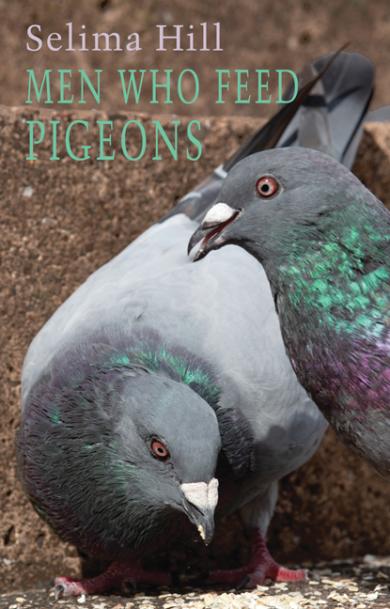Men Who Feed Pigeons (Shortlisted, TS Eliot Prize 2021)
Selima Hill
(Bloodaxe, 2021); pbk: £12

Curiously thin, with ginger hair,
the poacher is transforming himself
before my very eyes into a fox
that throws me toffees as it shoots by.(‘The Poacher’)
Some reckon that to be competition-fit a poem requires an arresting title. With a back catalogue encompassing collection titles as extraordinary as Trembling Hearts in the Bodies of Dogs, People Who Like Meatballs and The Magnitude of My Sublime Existence, Selima Hill brims with relevant expertise. The contents list in this, her latest collection, is a poem in itself. From the uncompromising opening section (‘The Anaesthetist’), where every poem is headed with the definite article, an occupation or character description (‘The Uncle’, ‘The Banker’, The Geek’) through to a later grouping all starting ‘His’, and later via ‘The Toes of the Woman I’ve Never Met’, ‘The Warmth of the Knife’,’The Beautiful Man with the Unpronounceable Name’, there’s great strength, both individually and in the building shape. Almost Belloc-like too in her use of titular capitalisation, this makes a considerable statement in terms of both challenging contemporary norms and how this headlining balances brevity in the poems that follow. There are, after all, around 300 poems in Men Who Feed Pigeons, grouped in seven sections. A substantial number of these poems are of four lines, arranged in paired couplets (structurally, and significantly, that pattern is established, disrupted and recovered), and initially, the effect of this is somewhat overwhelming. Not so much Tracey Emin’s famous ‘My Bed’, but more an almost dizzying recording of the relationship had with almost every man ever met. Yes, there are long-term developments with father, lovers, but also ‘The Nurse ‘ injecting her (‘He’s inching up my arm like a bee’) and other fleeting acquaintances. Tread carefully though however; as in life, the seemingly inconsequential often reappears with more significance than first assumed. In this compact poetry, the unsaid shadow boxes deftly.
Other than the opening sequence, which responds to men at work, each of the sections is formed around a particular, though never fully-named man, be it an uncle, neighbour, or ‘someone else’s ex-husband’. How do you read such a litany of short poems, each made with such a capacity to detonate? Arguably, with difficulties and re-tracings to uncover links you may have missed on a first reading. Despite their brevity, and their role in the larger narrative, these poems are far from fragmentary, being tightly self-contained, whilst also articulating with one another within the collection’s wider scope. There are connections and abrupt, unsettling disconnections. Pascale Petit has said of Hill’s earlier work (Jutland) that each poem contains an uncomfortable truth, through a fireworks of surreal images. Fiona Sampson described her as ‘the brilliant lyricist of human darkness’. Those words apply equally here.
and mock the questions I will never ask
because I am afraid of the answers.
(‘The Golden Pennies’)
That darkness is omnipresent even when laced with humour, and sent off with a bouncing assonance. Although the suggestion is that each section is discrete, it’s hard to be completely confident of that as certain themes reappear. That acutely observant narrator, so often passive in her fate even whilst documenting it with such perception, the undercurrent of obsession, physical and psychological disintegration, and uneven power (to the point of gaslighting) is cumulatively chilling. Whilst there is no suggestion that this is an autobiographical work, it’s difficult to pare away the suspicion that there is considerable lived experience in these immaculately crafted verse shrapnel. A tessellated portrait built from vignettes of others:
and then the hand, familiar as loss[.]
(‘Hand’)
The final section operates differently from the preceding six, turning the focus more directly on the narrator in a poignant study of where the protagonist has little agency left.
Overall, this is a remarkable collection, demanding considerable revisiting, and it is set to pierce very deeply.
I’ve disappeared, I’ve gone, I’ve left no trace
except the footprints of a large bear,(‘The People Who Still Call Themselves My Loved Ones’)
Beth McDonough

Leave a Reply